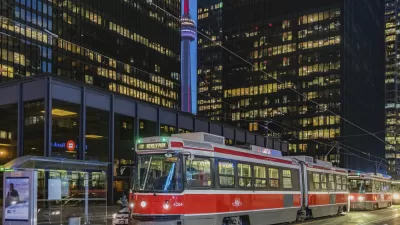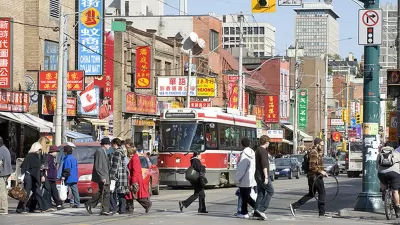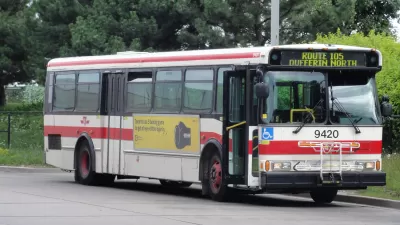Full or partial privatization of the Toronto Transit Commission (TTC) would likely result in diminished service and a less expansive transit network.
“In recent weeks, calls to privatize all or parts of Toronto’s transit service have grown louder and more frequent,” write Matt and Myer Siemiatycki.
The debate over privatization was sparked earlier this month by a pair of articles published in the Toronto Star which mulled privatization as a solution to the seemingly endless dis-satisfaction with transit service and lagging expansion.
“But arguments in favour of transit privatization amount to wishful thinking that defies both basic economic reasoning and the experience with transit privatization to date.”
In response to the suggestion that the TTC could auction off bus routes, the authors argue that some peripheral bus routes, while critical to the mobility of their users, are in fact money-losing. Profit-seeking private entities would have no choice but to eliminate or reduce the service on these routes, resulting in a net loss for Torontonians.
The claim by privatization advocates that the private sector will build subways in exchange for development rights is an argument that simply doesn’t add up. Many billions of dollars are required to build and operate subways whereas the value of development rights associated with value-uplifted land can be pegged at, perhaps, hundreds of millions.
“There is no free ride for the public purse under private involvement in transit. And any service ‘efficiencies’ would overwhelmingly come from cuts to non-profitable but needed services or from lower worker wages.”
FULL STORY: Privatization won’t solve Toronto’s transit problem

Study: Maui’s Plan to Convert Vacation Rentals to Long-Term Housing Could Cause Nearly $1 Billion Economic Loss
The plan would reduce visitor accommodation by 25,% resulting in 1,900 jobs lost.

North Texas Transit Leaders Tout Benefits of TOD for Growing Region
At a summit focused on transit-oriented development, policymakers discussed how North Texas’ expanded light rail system can serve as a tool for economic growth.

Why Should We Subsidize Public Transportation?
Many public transit agencies face financial stress due to rising costs, declining fare revenue, and declining subsidies. Transit advocates must provide a strong business case for increasing public transit funding.

How to Make US Trains Faster
Changes to boarding platforms and a switch to electric trains could improve U.S. passenger rail service without the added cost of high-speed rail.

Columbia’s Revitalized ‘Loop’ Is a Hub for Local Entrepreneurs
A focus on small businesses is helping a commercial corridor in Columbia, Missouri thrive.

Invasive Insect Threatens Minnesota’s Ash Forests
The Emerald Ash Borer is a rapidly spreading invasive pest threatening Minnesota’s ash trees, and homeowners are encouraged to plant diverse replacement species, avoid moving ash firewood, and monitor for signs of infestation.
Urban Design for Planners 1: Software Tools
This six-course series explores essential urban design concepts using open source software and equips planners with the tools they need to participate fully in the urban design process.
Planning for Universal Design
Learn the tools for implementing Universal Design in planning regulations.
City of Santa Clarita
Ascent Environmental
Institute for Housing and Urban Development Studies (IHS)
City of Grandview
Harvard GSD Executive Education
Toledo-Lucas County Plan Commissions
Salt Lake City
NYU Wagner Graduate School of Public Service





























